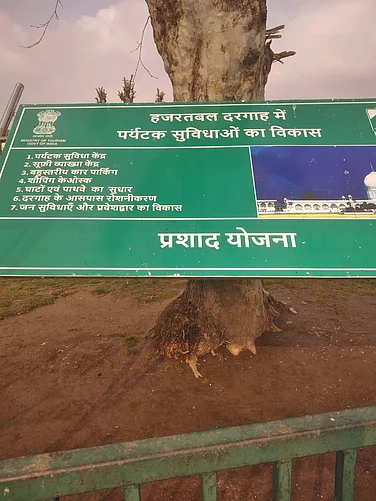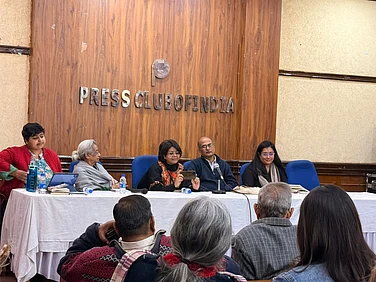Could it be someone I met?
I wonder if I knew any of the 24 jawans killed in the Maoist attack on two paramilitary base camps in West Bengal’s West Midnapore district.
I remember a rainy afternoon in Lalgarh sometime in July of last year. The government had just announced plans to launch a more powerful post-Monsoon anti-Maoist offensive than the joint paramilitary and police operation that had begun a month earlier.
We were at one of the base camps trying in vain to extract details of military strategy from the commander-in-chief. He divulged little but insisted that, as his guests, we could not leave without having lunch. It was a delicious and wholesome meal of roti, rice, dal and sabzi.
Stretching out all around us were the dense forests of Jungle Mahal. Earlier we had gone inside those jungles and spoken, for their side of the story, to the enemy of the paramilitary and police. There, we had tea in clay cups. Journalists are not their targets. The paramilitary and the police are.
There were armed sentries guarding the entrances and the fences of the paramilitary camp, but it was hardly a fortress. I wondered how attack-proof it really was. Jawans, officers and commanders were relaxing, chatting and chilling. Is it possible for them to always be on guard? What about attrition? What about sudden surprise attacks? But I dismissed the thought as one of those inane, fleeting ones.
Today I realize it was not such an inane thought after all. According to reports trickling in, the men at the camp were virtually sitting ducks. None other than Special EFR Inspector-General of police Benoy Chakraborty has said so.
The enemy sneaked up in the evening and set fire to the camps, overpowering and outnumbering the sentries and guards before shooting them down.
I wonder if among them was that shy young man who burst into a smile from behind his rifle – which was pointed in the general direction of the gate – when I jokingly implored him not to shoot us as we entered the camp. Or that embittered young boy who was, in his words, “hurt by newspaper reports claiming that we are cruel to villagers when all we are trying to do is protect them with our lives.” Or that hospitable jawan who told us, “If you’re still in the area in the evening, come back for dinner.”
Sometimes statistics on the deaths and murders of jungle tribals and villagers makes me wonder, “Could it be someone I met?” Maybe that elderly villager, who looked fearfully around and refused to comment on whether it was more scary to be thought a Maoist than to be targeted by one, saying “I will be butchered if I say anything.”
Or maybe that tribal youth, who, face covered with a cloth, a set of arrows and a bow slung on his back, came out of the jungle carrying an aluminium kettle and served us piping hot tea in clay cups? He too, like that sentry at the paramilitary camp, burst into a smile from behind his face-cloth when I asked him jokingly, “Hope you’re not planning to use those poison arrows on us?”
But anger flashed in his eyes when he spoke about the time when “the police humiliated my wife.”
Did that paramilitary sentry and that tribal youth confront each other on this fateful night? I wonder.
Who understands Cricket?
Sunil Gavaskar had briefly dropped in to the box in which we were sitting during the second Test match in Calcutta between India and South Africa, to say hello to someone. To a question from this gentleman about how he managed to stay so fit, Gavaskar replied, “Well, my wife doesn’t let me eat anything.” When I told Gavaskar that I don’t really understand cricket, he said, “None of us do, we just pretend that we do.”
On the fourth day of the second test match, the game was cancelled because of rain. I finally managed a trip to the multiplex cinema hall at the new South City Mall to see the James Cameron epic Avatar – which I’d been hoping to catch before it leaves the theatres. When my husband was buying the 3D glasses, patiently waiting in queue behind him was Gary Kirsten, the Indian cricket coach. He was also patiently waiting behind us in the popcorn line. Later we saw him sauntering into the auditorium with his 3D glasses in one hand while his other hand precariously balanced a large bucket of popcorn and a jumbo can of coke. I couldn’t figure out how in the world he was still managing to pop pieces of popcorn into his mouth as he walked up the aisle, without either dropping a single piece on the ground or spilling the coke. Well, I guess this is a man with unusual powers. India won, didn’t it? And then again, at Jaipur and today at Gwalior. And as Sachin said today, " I have enjoyed the game 2007 onwards and the credit goes to Gary. He has held the team beautifully, it's about holding the team together." Yes, that man knows how to hold things together for sure.
Avatar parallels
Watching ‘Avatar’ I kept being reminded of Lalgarh, Nandigram and Singur, the three most contentious issues plaguing Bengal today. The movie takes place in a world called Pandora. The ‘Avatars’ – a breed of creatures whose DNA is half human and half Na’vi, the people indigenous to Pandora – are sent to Pandora by humans, ostensibly to win the locals’ trust and to help their civilization grow. The real motive, of course, is a little more self-serving. The humans crush the peace-loving people of Pandora, using not just super high-tech weaponry, but also sinister strategies. They deploy various unsuspecting and trusting people – marines, scientists and research scholars – those who have the personality and the potential to strike up friendships with the locals. The goal is to get control of Pandora’s rich natural resources. When the locals resist, the humans respond with overwhelming force. The story bears an uncanny resemblance to current events in Lalgarh, Nandigram and Singur. The purported reason for industrial development in these areas – the Jindal plant near Lalgarh; the chemical hub in Nandigram; the Tata Nano factory in Singur – is to foster economic growth and employment opportunity for the local communities. But the real intent, critics argue, is to wrest land and mineral resources from indigenous peoples to serve corporate vested interests.
Exchange of Numbers
Union Home Minister P. Chidambaram had assured us of more talks! He had dashed off letters to the Bengal, Bihar and Jharkhand chief ministers expressing concern about the ‘Maoist Menance’. He wanted to talk. There was some talking done on February 9 too when Mr. Chidambaram, Orissa Chief Minister Navin Patnaik and Bengal Chief Minister Buddhadeb Bhattacharjee met in Calcutta and talked. Bihar Chief Minister Nitish Kumar and Jharkhand Chief Minister Shibu Soren couldn’t talk – poor things! – at that time as one of them was unwell and the other had some other issues. Earlier too many people talked. Remember that high-profile Conference on Internal Security when the Prime Minister talked to the chief ministers in Delhi some months ago? That was a really high-level talk! This time too the talk will be in Delhi. But then we had the sudden, much touted 'conditional ceasefire'. A day after Kishanji proposed it, Mr Chidambaram rejected the offer. "I would like no ifs, no buts and no conditions," the home minister emphasized. He added that if the Maoists were willing to promise to abjure violence, they could fax their truce offer directly to him, on 011-23093155. Kishanji went a step further. Responding to the invitation, he said, ''If he (Chidambaram) wants to talk on our ceasefire proposal, let him speak to me on my phone number 09734695789. He is welcome to call me on February 25 but after 5pm.'' He did not spell out if he was ready to meet Chidambaram's demand to cease violence. Watch this space.
Kishenji's Telephone Number
I am not sure who came up with it first, but it's been forwarded as an SMS all over the place. Kishenji announces his phone number. Now we don't need the government to fight him. HDFC/ ICICI will finish him off. The home ministry fax is reportedly deluged with complaints, while the number given by Kishenji has been kept busy by the media -- with no response, we are told. But then, he did specify a time and date...
Half the world is Bengali?
I debated whether I should risk my job by revealing the following. But being a journalist, it is the story that matters. When our editor-in-chief Vinod Mehta came recently to Calcutta on his way to Burma, he said the following about the importance of Bengal in the world. And I quote, “Half the world is Bengali.” Then, after a pause, “The other half is non-Bengali.” In the room were three people. He, his wife Sumita, a Bengali, and I, another Bengali. I am sure he was speaking metaphorically but am not sure whether he counted himself as one or not.


























